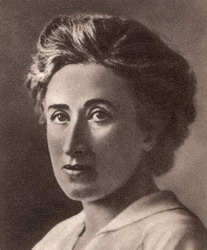

|
|

The Old Mole
Luxemburg, Rosa
http://www.connexions.org/CxArchive/MIA/luxemburg/1917/04/oldmole.htmhttp://www.marxists.org/archive/luxemburg/1917/04/oldmole.htm Publisher: Spartacus Year Published: 1917 Resource Type: Article Cx Number: CX7985 The question of peace is in reality bound up with the unimpeded, radical development of the Russian Revolution. But the latter is in turn bound up with the parallel revolutionary struggles for peace on the part of the French, English, Italian and, especially, the German proletariat. Abstract: - Excerpt: The victory of the revolution, as well as its further tasks, requires more secure backing for the future. The outbreak of the revolution and the commanding position assumed by the proletariat has immediately transformed the imperialist war in Russia into that which the mendacious clap-trap of the ruling classes would have us believe it is in every country: a war of national defence. The beautiful dreams of Constantinople and the ‘national-democratic’ plans for reapportionment, which were to make the world so happy, were thrust back down the throats of Milyukov and his associates by the masses of workers and soldiers, and the slogan of national defence was put into practice. However, the Russian proletariat can end the war and make peace with a clear conscience only when their work – the achievement of the revolution and its continued unhampered progress – has been secured! They, the Russian proletariat, are today the only ones who really have to defend the cause of freedom, progress and democracy. And these things must today be preserved not only against the chicanery, the pressure and the war mania of the Entente bourgeoisie, but tomorrow above all – against the ‘fists’ of the German ‘liberators’. A semi-absolutist police and military state is not a good neighbour for a young republic shaken by internal struggles, and an imperialist soldiery schooled in blind obedience is not a good neighbour for a revolutionary proletariat which is making ready for the most intrepid class struggles of unforeseeable significance and duration. ... Thus the question of peace is in reality bound up with the unimpeded, radical development of the Russian Revolution. But the latter is in turn bound up with the parallel revolutionary struggles for peace on the part of the French, English, Italian and, especially, the German proletariat. Will the international proletariat shift the responsibility for coming to terms with the European bourgeoisie on to the Russian workers’ shoulders, will it surrender this struggle to the imperialist mania of the English, French and Italian bourgeoisie? At the moment this is how the question of peace should really be formulated. The conflict between the international bourgeoisie and the Russian proletariat thus reveals the dilemma of the last phase of the global situation: either world war to the verge of universal ruin or proletarian revolution – imperialism or socialism. And here again we are confronted by our old betrayed slogans of revolution and socialism, words which we repeated a thousand times in our propaganda and which we failed to put into practice when, on the outbreak of war, the time came to give substance to them. They again presented themselves to every thinking socialist as the futile genocide dragged on. They presented themselves once more in an obviously negative form as a result of the wretched fiasco of the attempts of bourgeois pacifism at achieving a diplomatic agreement. Today we again see them in a positive light; they have become the substance of the work, the destiny and the future of the Russian Revolution. Despite betrayal, despite the universal failure of the working masses, despite the disintegration of the Socialist International, the great historical law is making headway – like a mountain stream which has been diverted from its course and has plunged into the depths, it now reappears, sparkling and gurgling, in an unexpected place. Old mole. History, you have done your work well! At this moment the slogan, the warning cry, such as can be raised only in the great period of global change, again resounds through the International and the German proletariat. That slogan is: Imperialism or Socialism! War or Revolution! There is no third way! Subject Headings |